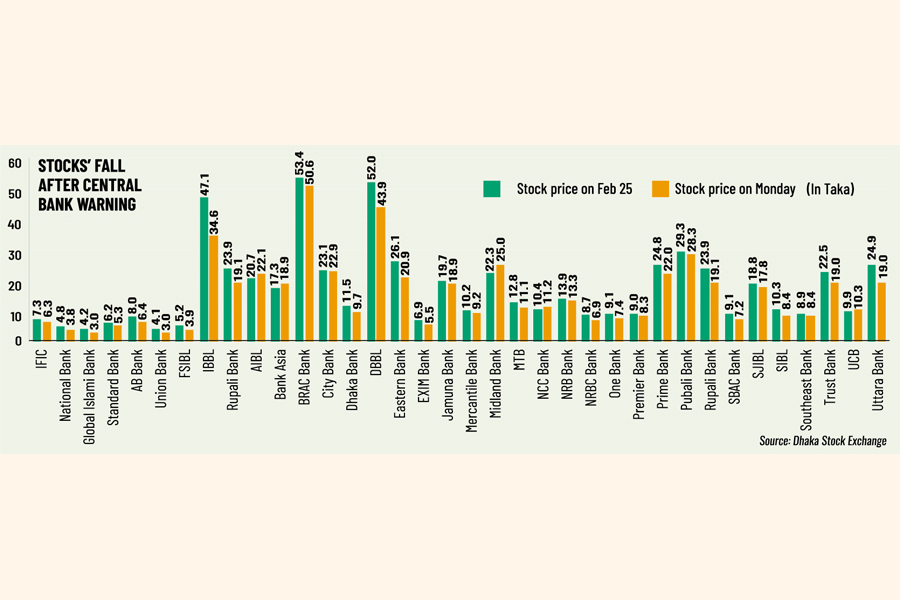Bank stocks mirror lenders' sapping financial health as investors react to news

Published :
Updated :

Bank stocks that used to be investors' preferred choice among equities for investment have long been failing to attract buyers because of their weakening financial health. The latest news over the lenders' deepening capital shortfalls dragged them to a new low.
For example, Global Islami Bank (GIB), which was listed only two years ago, fell 3.23 per cent to close at Tk 3 per share on Monday on the Dhaka Stock Exchange whereas its face value is Tk 10 each share. The stock price of Union Bank, listed around the same time, closed at Tk 3.1 a share on the DSE.
The banks that are facing acute capital shortfalls also include AB Bank, EXIM Bank, First Security Islamic Bank, ICB Islamic Bank, IFIC Bank, National Bank, NRBC Bank, One Bank, Premier Bank, South Bangla Agriculture Bank, and Standard Bank.
Of these trouble-hit banks, Union Bank has a capital shortfall of Tk 156.89 billion, First Security Islami Bank Tk 139.91 billion, Social Islami Bank Tk 117.08 billion, IFIC Bank Tk 90 billion and National Bank Tk 77 billion.
Experts say the gravity of the financial problems facing the banks got exposed after the fall of the previous regime as the central bank began taking corrective measures. The secondary market showed a reflection of that almost immediately.
On February 25, Bangladesh Bank Governor Ahsan H Mansur said that despite the efforts to salvage scam-hit commercial banks, it might not be possible to keep some of them functional.
Prudent investors must have seen signs of warning in the revelation. So, the statement by the highest authority in the sector was a trigger sending most bank stocks on a downward spiral.
For example, the stock of Social Islami Bank rose to Tk 10.30 per share from Tk 8.70 per share from mid January through February 25. Then it started declining and closed at Tk 8.50 per share on Monday.
Midland Bank was an exception. It witnessed a 70 per cent appreciation in the stock price since April 10 despite a 28 per cent year-on-year decline in profit in 2024. Market insiders suspect foul play in such unexpected stock price rises.
Md. Ashequr Rahman, managing director of Midway Securities, said uncertainties hanging over a bank's survival are a matter of great concern, especially to equity investors.
"If a bank collapses, depositors will be the first priority to the government when it comes to compensation. Equity holders will be at the bottom."
After the settlement of the dues of depositors and other claimants, equity holders may not get anything as the liabilities of the trouble-hit banks are much higher than their assets.
"In this situation, an equity holder will try to offload his shares even with losses," added Mr Rahman.
BB actions to help reshape banking sector
An industry insider, wishing not to be named, said the availability of liquidity squeezed as the central bank had streamlined the cash management by phasing out the 28-day-repo facility.
Earlier, the BB requested well-performing banks to provide cash support to the weak banks under a guarantee scheme. Despite the guarantee by the banking regulator, the well-off banks remained reluctant to lend funds to the troubled banks.
The banks that disbursed credits charged as high as 14 per cent interest, creating a more troublesome situation for the non-compliant banks.
Considering the financial pain of the cash-strapped banks, the central bank then came up with a direct cash support to ease the lenders' liquidity pressure.
According to the central bank data, around Tk 300 billion has so far been disbursed as part of the regulator's revitalization plan.
But the cash feeding programme has not yielded expected outcome because the lenders' liabilities were worth much higher than their assets.
Amid the mess, six commercial banks -- BRAC Bank, The City Bank, Prime Bank, Pubali Bank, Eastern Bank and Uttara Bank-- are in a very suitable position, having gained record profits in 2024 because of their strong financial position.
The central bank said it would try to save the weak banks through merger with strong ones but that was not suffice in dispelling fears of equity holders of losing investments.
Mr Rahman stressed the importance of re-capitalisation of the banks along with their accurate reporting of financial performance as any sign of revival of the banks could restore investor confidence.
mufazzal.fe@gmail.com


 For all latest news, follow The Financial Express Google News channel.
For all latest news, follow The Financial Express Google News channel.